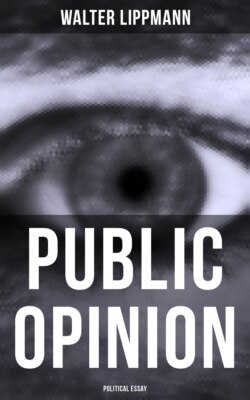Читать книгу Public Opinion: Political Essay - Walter Lippmann - Страница 34
На сайте Литреса книга снята с продажи.
2
ОглавлениеIf we cannot fully understand the acts of other people, until we know what they think they know, then in order to do justice we have to appraise not only the information which has been at their disposal, but the minds through which they have filtered it. For the accepted types, the current patterns, the standard versions, intercept information on its way to consciousness. Americanization, for example, is superficially at least the substitution of American for European stereotypes. Thus the peasant who might see his landlord as if he were the lord of the manor, his employer as he saw the local magnate, is taught by Americanization to see the landlord and employer according to American standards. This constitutes a change of mind, which is, in effect, when the inoculation succeeds, a change of vision. His eye sees differently. One kindly gentlewoman has confessed that the stereotypes are of such overweening importance, that when hers are not indulged, she at least is unable to accept the brotherhood of man and the fatherhood of God: "we are strangely affected by the clothes we wear. Garments create a mental and social atmosphere. What can be hoped for the Americanism of a man who insists on employing a London tailor? One's very food affects his Americanism. What kind of American consciousness can grow in the atmosphere of sauerkraut and Limburger cheese? Or what can you expect of the Americanism of the man whose breath always reeks of garlic?"47
This lady might well have been the patron of a pageant which a friend of mine once attended. It was called the Melting Pot, and it was given on the Fourth of July in an automobile town where many foreign-born workers are employed. In the center of the baseball park at second base stood a huge wooden and canvas pot. There were flights of steps up to the rim on two sides. After the audience had settled itself, and the band had played, a procession came through an opening at one side of the field. It was made up of men of all the foreign nationalities employed in the factories. They wore their native costumes, they were singing their national songs; they danced their folk dances, and carried the banners of all Europe. The master of ceremonies was the principal of the grade school dressed as Uncle Sam. He led them to the pot. He directed them up the steps to the rim, and inside. He called them out again on the other side. They came, dressed in derby hats, coats, pants, vest, stiff collar and polka-dot tie, undoubtedly, said my friend, each with an Eversharp pencil in his pocket, and all singing the Star-Spangled Banner.
To the promoters of this pageant, and probably to most of the actors, it seemed as if they had managed to express the most intimate difficulty to friendly association between the older peoples of America and the newer. The contradiction of their stereotypes interfered with the full recognition of their common humanity. The people who change their names know this. They mean to change themselves, and the attitude of strangers toward them.
There is, of course, some connection between the scene outside and the mind through which we watch it, just as there are some long-haired men and short-haired women in radical gatherings. But to the hurried observer a slight connection is enough. If there are two bobbed heads and four beards in the audience, it will be a bobbed and bearded audience to the reporter who knows beforehand that such gatherings are composed of people with these tastes in the management of their hair. There is a connection between our vision and the facts, but it is often a strange connection. A man has rarely looked at a landscape, let us say, except to examine its possibilities for division into building lots, but he has seen a number of landscapes hanging in the parlor. And from them he has learned to think of a landscape as a rosy sunset, or as a country road with a church steeple and a silver moon. One day he goes to the country, and for hours he does not see a single landscape. Then the sun goes down looking rosy. At once he recognizes a landscape and exclaims that it is beautiful. But two days later, when he tries to recall what he saw, the odds are that he will remember chiefly some landscape in a parlor.
Unless he has been drunk or dreaming or insane he did see a sunset, but he saw in it, and above all remembers from it, more of what the oil painting taught him to observe, than what an impressionist painter, for example, or a cultivated Japanese would have seen and taken away with him. And the Japanese and the painter in turn will have seen and remembered more of the form they had learned, unless they happen to be the very rare people who find fresh sight for mankind. In untrained observation we pick recognizable signs out of the environment. The signs stand for ideas, and these ideas we fill out with our stock of images. We do not so much see this man and that sunset; rather we notice that the thing is man or sunset, and then see chiefly what our mind is already full of on those subjects.
